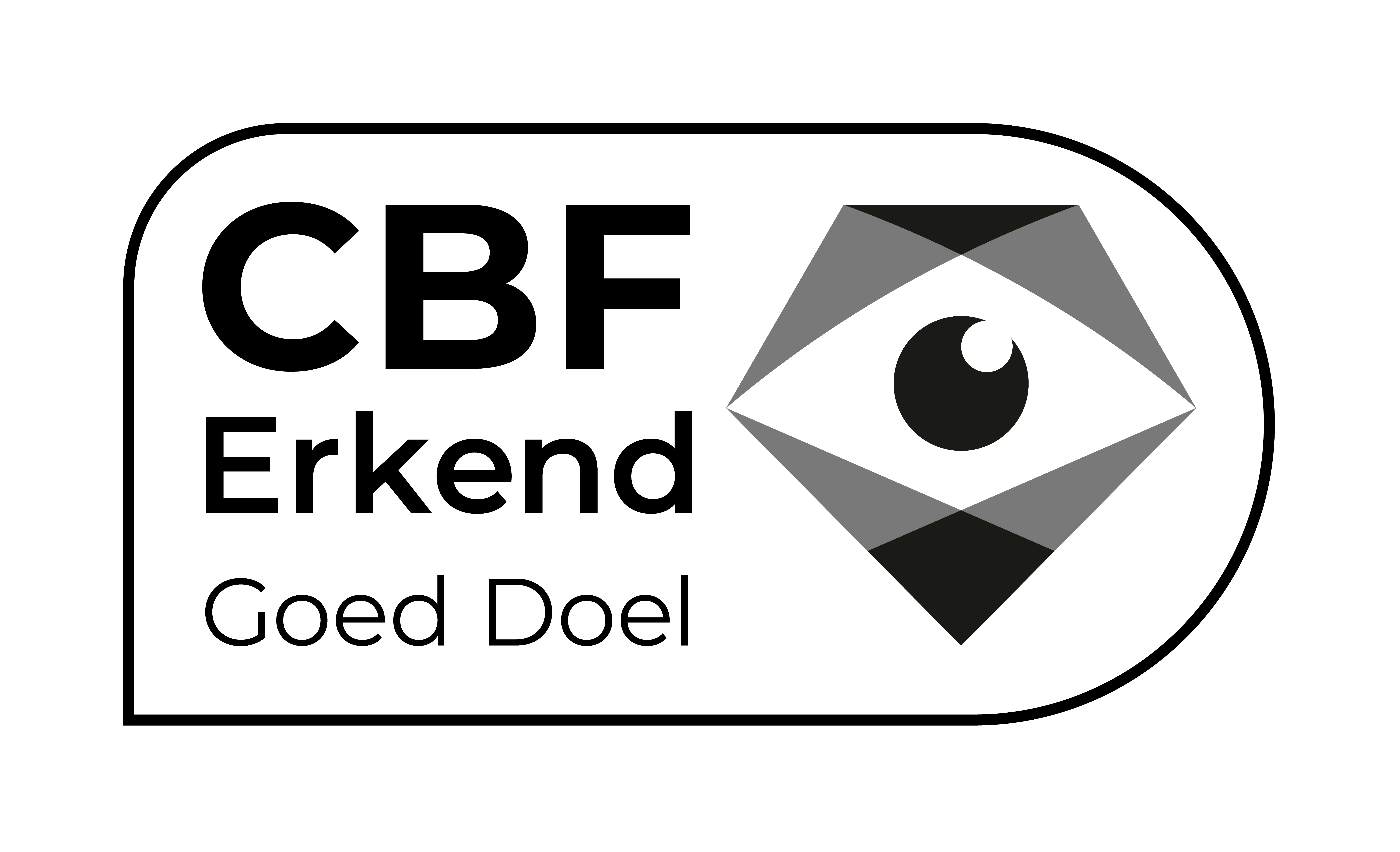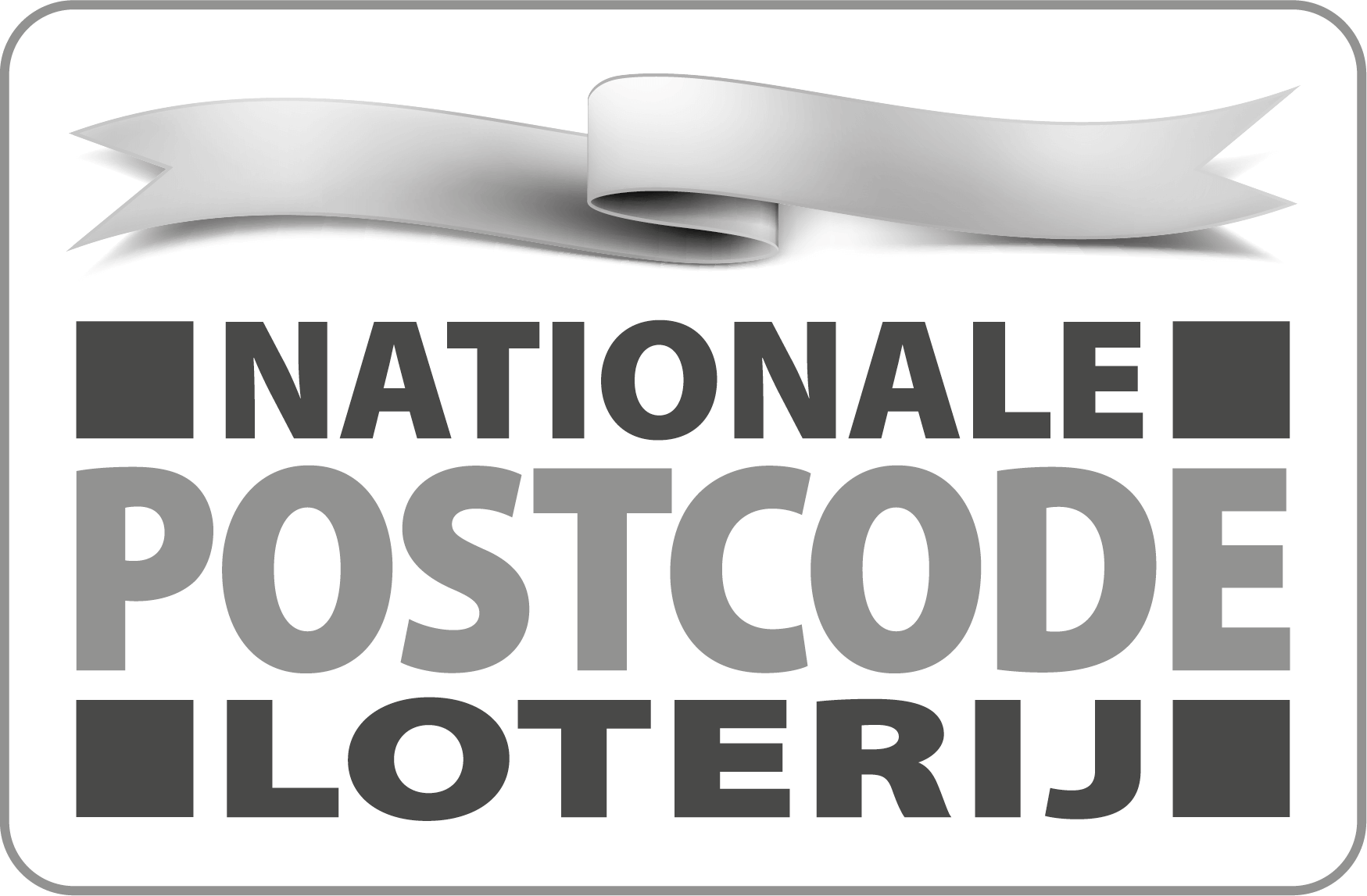News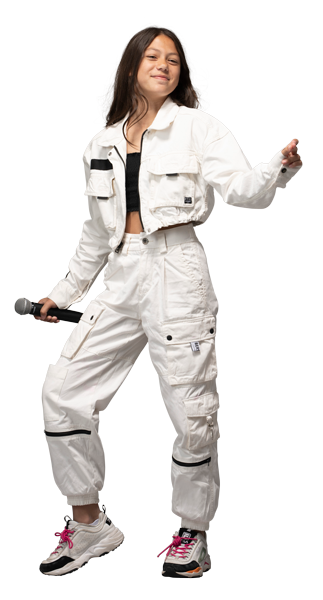
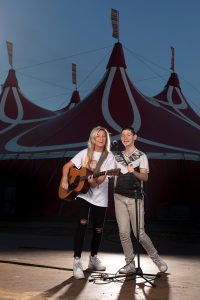 Sanne Hans (Miss Montreal) sings, writes, and makes music. Sanne is an ambassador for the Youth Fund for Sports and Culture. She grew up in a family where making music was a given. There was a piano and guitars at home. Sanne played the violin and was in a band with her brother. Her parents were also in a band. "We always made music. It was just part of it."
Sanne Hans (Miss Montreal) sings, writes, and makes music. Sanne is an ambassador for the Youth Fund for Sports and Culture. She grew up in a family where making music was a given. There was a piano and guitars at home. Sanne played the violin and was in a band with her brother. Her parents were also in a band. "We always made music. It was just part of it."
Sanne leads a busy life, full of performing, composing, and TV programs. Yet, she still makes time to be an ambassador for the Youth Fund for Sport & Culture. "I think it's very important to motivate children," she says. "That's why I plan to go to schools and tell them that children growing up in poverty can also participate. I can't wait!"
Only busy with music
Music was and still is an important outlet for Sanne. She was already heavily involved with music as a child, but in seventh grade, Sanne started taking it seriously. "I participated in a local Soundmix show," she says. "I came in second. I was heartbroken; I just wanted to be the very best. After that, I started playing guitar, and my first self-made song soon followed. Then I thought, 'Oh, that's what I meant, that's what I want! So I can decide for myself what I want to play.' A whole new world opened up for me. I was busy with it day and night; I barely left the house anymore; I was only focused on music."
From violin to singing lessons
"After years of violin lessons, I switched to singing lessons when I was about ten. To be honest, I didn't like it at all and quickly quit. It was so different from making music myself. I just didn't feel like listening to those boring singing lesson songs. At 19th I took singing lessons again, truly classical. I learned a lot from that. I never have any problems with my vocal cords, thanks to that strong classical training. I'm very glad I did.
I could express all my tears in my music
I received a lot of encouragement and support at home. If you have a talent for something, it's wonderful and important that they're proud and happy at home, too, and sympathize with you. But it's not just about talent. Music was also an important outlet for my emotions. When my parents divorced, I struggled immensely. I sought solace in making music. I could express all my tears by playing piano, guitar, or singing for hours. That helped me immensely. So I know from experience how important it is for a child or teenager to have an outlet, to have the opportunity to forge their own path. I know how difficult it can be. Ensuring that every child has an outlet is what motivates me to become an ambassador.
Magic
Music is still an outlet, even though it's my job now. Imagine I'm having a fight with my boyfriend. When I play, that fight disappears from my mind. It just makes me feel better; that's still something magical. When I make music, I feel alive and very close to myself. I feel special then.
Follow Miss Montreal
Facebook: missmontrealmusic
Twitter: @MissMontreal
Instagram: @missmontreal_
Marianne Vos, olympisch en wereldkampioen wielrennen, is ambassadeur van het Jeugdfonds Sport & Cultuur. Ze maakt deel uit van Team Jumbo Visma, partner van ons fonds.
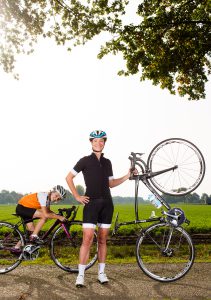
Koelbox mee
“De eerste wedstrijd die ik mocht rijden, was een dikkebandenrace in Geffen. Het jongetje dat tweede werd, was helemaal gesoigneerd, had klikpedalen op zijn fiets gemonteerd en was zelfs ‘warm gezet’. Maar ik won.
“Mijn broer Anton en mijn vader waren lid van wielervereniging Presto in Drunen. En dus gingen we met de hele familie mee naar wedstrijden; koelbox mee, stoeltjes, washandjes in een zakje. We zaten de hele dag langs het parcours, zagen alles: van de eerste tot de laatste categorie. Op mijn achtste mocht ik eindelijk ook wedstrijden rijden.”
Stikchagrijnig
“Als klein meisje vond ik het vanzelfsprekend dat mijn ouders op dinsdag en donderdag van Wijk en Aalburg naar Drunen en weer terug reden met een auto vol materiaal. Als ik een keer een parcours wilde verkennen, keek ik mijn vader lief aan, smeerde mijn moeder de boterhammen en waren we vertrokken. Dat kon altijd, het was nooit een vraag. In de juniorentijd, toen ik andere meiden ontmoette bij wie thuis niet alles in het teken van wielrennen stond, besefte ik dat het helemaal niet zo logisch was.”
“Geld hadden we nooit over, maar als er nieuw materiaal voor het wielrennen moest komen werd het links of rechts altijd georganiseerd. Ik zag dat niet iedereen om me heen dat had. En dan ging het vaak niet eens om geld, maar om tijd en aandacht.”
“Mijn vader was jeugdbegeleider bij de club, maar ik ben nooit door hem getraind, ben nooit gepusht. Hij was er wel altijd voor me, net als mijn moeder. Ze hebben ook nooit langs de kant staan schreeuwen. Ja, ‘kom op Marianne’, dat riepen ze.”
“Als ik niet won, viel er geen onvertogen woord. Dat hoefde ook niet, want dan was ik zelf niet te genieten. Daar schaam ik me nu nog voor. Reden mijn ouders het hele land door, was ik na afloop van de race stikchagrijnig. Dat ging helemaal nergens over. Echt onfatsoenlijk.”
Twee persoonlijkheden
“Ik uitte me helemaal niet als kind. Ik observeerde, keek rond en verder deed ik weinig. Natuurlijk ging ik wel buitenspelen. Dan bouwde ik tenten, of voetbalde ik. Maar op school was ik de stilste van de klas, was ik nauwelijks aanwezig. Dat gaf niks, ik voelde me daar prima bij. Maar op de fiets kon ik de energie die ik op die momenten niet gebruikte juist kwijt. Ik voelde dat ik goed kon fietsen, en dat wilde ik graag laten zien. Ik wilde me bewijzen. Het vuur dat ik op die fiets had, was enorm. Ik vrat mensen echt op.
“Die twee persoonlijkheden zijn in de loop der jaren meer één geworden, zijn naar elkaar toegegroeid. Juist het besef dat ik op de fiets meer mezelf was, heeft me geholpen om mezelf te ontwikkelen in die wereld naast de fiets.
“Als ik de sport niet had ontdekt, had ik die andere kant van mezelf waarschijnlijk nooit gevonden. Ik had mezelf minder leren kennen, ik zou me nu minder kunnen uiten. De kans is groot dat ik dan als een of andere kluizenaar in mijn huisje had gezeten om alleen maar naar buiten te gaan om van negen tot vijf te gaan werken.”
Niks om voor te schamen
“Als het Jeugdfonds Sport & Cultuur er in mijn jeugd was geweest, had ik er waarschijnlijk gebruik van gemaakt. Ik denk dat ik er baat bij had gehad. Het zou net het steuntje in de rug zijn geweest wat ik had kunnen gebruiken. Maar we hebben het op de een of andere manier zelf kunnen rooien. Alle vrije tijd en al het geld ging op aan de fiets.
“Er ligt een taboe op het vragen van hulp. Ik snap dat wel. Ouders willen niet snel toegeven dat ze hun kind niet kunnen laten sporten. Je wil je kind het beste geven, en als je het gevoel hebt dat je daarin tekort schiet, ben je daar waarschijnlijk niet heel trots op. Maar als je weet hoe ontzettend groot de groep die hulp nodig heeft in Nederland is, besef je dat het niks is om je voor te schamen.”
“Toen ik bij de nieuwelingen zat, kreeg ik mijn eerste sponsor: Gijs van Tuyl uit Bruchem. Hij had gehoord dat we het niet zo breed hadden en nodigde ons uit voor een gesprek in zijn fietswinkel. We hebben nooit een contract getekend, maar ik heb zes jaar lang op zijn fietsen gereden. Dat was een hele belangrijke omslag voor ons. We hadden nooit het geld gevonden om én wegfietsen, én tijdritfietsen, én crossfietsen te kopen.”
“Ik zie en spreek Gijs nog steeds. Hij zag toen iets in mij, ondanks dat ik zo jong was. Zo werkt het natuurlijk ook voor kinderen die gebruik maken van het Jeugdfonds Sport & Cultuur. Dat is de sponsor die het voor hen mogelijk maakt dat ze kunnen sporten. Ik heb het een paar keer van dichtbij meegemaakt wat dat doet met kinderen, wat het betekent voor hun ouders. Dat is heel bijzonder. Voor een bedrijf is die vorm van sponsoring minder zichtbaar en dus moeilijker te verkopen. Maar ze zouden het een keer met eigen ogen moeten zien.”
Help ook een kind in armoede aan een fiets via Heel Holland Fietst
Volg Marianne
Instagram: @mariannevosofficial
Twitter @Marianne_Vos
Meer over Jeugdfonds Sport & Cultuur en Team Jumbo-Visma
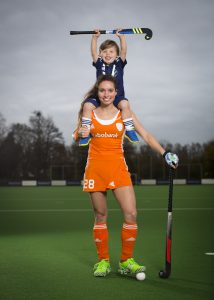
Ginella Zerbo, hockey international en spits van SCHC en het Nederlands elftal, is ambassadeur van het Jeugdfonds Sport & Cultuur.
Lekker rennen
“Eigenlijk wilde ik voetballen. Dat deed ik vaak op het schoolplein, samen met de jongens. Maar mijn moeder zag het niet zitten, vond het een te fysieke sport voor meisjes. Ze is opgegroeid in de voetbalwereld, haar broer en vader waren allebei fanatieke voetballers, zelf was ze scheidsrechter. Ze had er wel genoeg van denk ik. Eerst heb ik nog geprobeerd te dansen en te turnen, maar zonder ritmegevoel werd dat wat lastig… Na aan korfbal en tennis te hebben gedaan, heb ik uiteindelijk gekozen voor hockey. Als kind moest ik mijn energie kwijt, ik was best druk. Lekker rennen, dat had ik nodig. Zelfs toen ik op een gegeven moment twee keer per week hockeyde, bleef ik daarnaast tennissen.”
Je kan het niet alleen
“Mijn ouders laten me vrij in wat ik wil. Dat hebben ze altijd al gedaan. Er is nooit tegen me gezegd dat ik móest sporten. Als ik nu zou willen stoppen met hockeyen, zou dat ook goed zijn. Natuurlijk zouden ze het zonde vinden, maar ze willen vooral dat ik plezier heb in wat ik doe. Dat is het belangrijkste in hun ogen.
“Mijn vader is er altijd bij, hij gaat mee naar elke wedstrijd. Eén keer is hij niet komen kijken. Ik was vijftien, en ik mocht meespelen in Dames 1 tegen hockeyclub M.O.P. in Vught. Heb ik er twee gescoord! Ha, ik was extra gemotiveerd! Daarna heeft hij nooit meer een wedstrijd overgeslagen. Samen met mijn vader naar een wedstrijd rijden, is een soort ritueel geworden. Toen ik het Europees kampioen onder zestien speelde in Valencia, stapte mijn moeder in de bus om erbij te kunnen zijn. Ze heeft namelijk vliegangst. Gelukkig had ze die busreis voor me over, dat vond ik heel vet.
“Als kind heb je eigenlijk als vanzelfsprekend je ouders nodig, maar ook nu is dat nog zo. Ze kunnen me als geen ander motiveren als het wat minder gaat. ‘Kom op, niet opgeven, door blijven zetten.’ Je kan het niet alleen. Zeker van je ouders wil je soms horen dat het echt wel weer goed komt.”
Anders denken en zijn
“Het leven is zoveel leuker als je sport. Buitenspelen doe je met je eigen vrienden, of vrienden van school. Als je bij een vereniging gaat sporten, bouw je een nieuwe vriendenkring op. Daardoor word je steeds socialer. Je leert er veel van door niet de hele tijd met dezelfde mensen op te trekken, door mensen te ontmoeten met andere interesses.
“Toen ik naar de middelbare school ging, verhuisden we naar Amsterdam-West. De kinderen daar waren heel anders dan mijn teamgenootjes in het hockey. Het waren echt twee verschillende culturen. Stond ik daar als klein meisje uit Den Haag, en dan deed ik ook nog aan hockey… Nou, dan ben je al een beetje een buitenbeentje. Maar uiteindelijk heb ik daar een leuke tijd gehad. Ik heb geleerd dat niet iedereen hetzelfde is, dat mensen anders kunnen denken en zijn.
“Hockey is best een eenzijdige wereld. Ik geef weleens clinics, coach ook de meisjes D1, en daar zie ik dat het toch anders is dan toen ik jong was. Het wordt langzaamaan wat normaler, minder kak. Daar ben ik best blij mee. Hockey is gewoon een supercoole sport, daar is niks bekakt aan.”
Cool voor kinderen
“Mijn hele familie heeft er voor gezorgd dat ik alle spullen kreeg die ik nodig had om te kunnen hockeyen. Opa’s, oma’s, ooms, tantes. Hockey is een dure sport. En hoe hoger het niveau is waar je op speelt, hoe duurder het wordt. Inmiddels heb ik gelukkig individuele sponsors, zoals Adidas.
“Het hebben van een sponsor neemt onrust bij me weg, ik maak me minder zorgen. Het voelt ook als steun. Er is een merk dat in mij gelooft, net zoals mijn familie dat doet. Als merken of bedrijven zich aansluiten bij het Jeugdfonds Sport & Cultuur, laten ze ook zien dat ze in kinderen geloven. En ik weet dat het voor bedrijven misschien lastig is om die stap te zetten; die sponsoring is natuurlijk minder zichtbaar. Maar ik denk dat het heel positief zou kunnen uitwerken voor merken, omdat mensen in de omgeving van die kinderen zien wat die bedrijven betekenen voor een ander. En ja, het zou cool zijn voor kinderen als een tof merk zich zou melden. Dan voelen ze zich bijzonder.”
Volg Ginella
Twitter: @GinellaZerbo
Instagram: ginellazerbo
Leer meer: op hockey via het Jeugdfonds
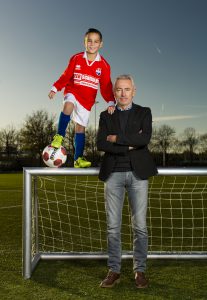
Bert van Marwijk, football coach and former national coach of the Dutch national team, is an ambassador for the Limburg Youth Sports Fund.
To survive
If I can believe my mother, I was already playing soccer when I could crawl. At first, mainly with balloons, later with a ball. I played real soccer on the street with friends. I lived in a working-class neighborhood in Deventer, and I'd walk straight out of our garden, through some alleyways, into a playground with a full-size soccer field. It was such a sociable place. Old and young mixed together. That's where I grew up.
On the street, you learn to survive, you have to make your own rules, you learn to make decisions. If there were nine of us on the street, we'd play four against four, and one person simply couldn't participate. Or we'd say, "We're going to play four against the five of you." Everyone knew what time it was. Sometimes that was quite harsh. That street was very defining for me; it shaped me. Nowadays, it's dangerous to play on the street; generations of children are growing up without learning to make their own decisions. So, you have to simulate that kind of situation at clubs and associations. And for that, you need good coaches."
Over the bridge
Most of Deventer lies on one side of the IJssel River. One neighborhood is on the other, and that's where I lived. When I was about seven, I wanted to play for Go Ahead, just across the bridge. But I was too young; you couldn't sign up until you were eight. They knew that story at the playground, and before I knew it, the treasurer of a local amateur club was standing right in front of me. He said I'd be very welcome there, so we'd just pretend I was eight.
After playing there for two years, I got on my bike and cycled across the bridge to the Go Ahead open day. If you caught the eye during that day, you could earn a spot in the squad. There I was, all alone. I felt like everyone knew each other. Yet, I was selected. After that, I went through all the teams and made my professional debut at seventeen. I appeared on television three times that year, in the matches against Ajax, Feyenoord, and PSV. It was so hard to see, I had to point my finger at the black-and-white TV screen. 'Look, Dad, that's me.'
Football boots costing 31 guilders
"I think my mother came to see me once. I fell. She turned around and never came back. She hated seeing me in pain. My father was proud; Go Ahead was his club too. He always followed me, wherever I went.
My father was my rock. I was confident enough to tell him anything. The first time he came to visit, I told him I didn't want him to yell or interfere. I was seven or eight years old. And he never did.
I still remember seeing a pair of football boots in the window of Sporthuis De Witte in Deventer. The price tag said 31 guilders, and I really wanted them… But I only got one guilder in pocket money a week. So I had to save for 31 weeks. When the last three or four weeks arrived, my father said, 'You've saved for so long, I'll give you a few extra guilders.' Those boots sat at the foot of my bed for two weeks before I finally put them on.
Big mouth
I was actually a shy boy. I blushed easily and was often embarrassed. Except when I had a ball at my feet or was playing outside. Then I was cheeky. I'd be the first to get into mischief. But when it was my turn in class, I wasn't so loud anymore.
Football made me grow up faster. For example, when I was twelve or thirteen, we went to London on an exchange with an English club. After a journey by boat, train, and bus, we finally arrived at the town hall. There, we were divided among host families. I saw everyone around me going to host families in pairs, and I was left alone. They said, 'You can already get by in English pretty well, so we've agreed you'll go alone.' I didn't like that at all. But it was a good lesson.
Crying and celebrating
Thirty-five years ago, I coached youth teams. There were sometimes a few boys among them who were completely on their own. Their parents were never on the sidelines. They were often reserved boys who would sit in the corner. I always tried to make it clear to them that they could come to me.
Those boys were in a club. But I also know there are children on the sidelines, children who can't participate, who can only watch their friends. And who are ashamed to say they need help. That's awful. When I woke up on Saturday morning as a child, I immediately put on my football kit and cleats. Then I quickly ate a few sandwiches and was off. Then I went to my playground, to my club.
Parents aren't so quick to approach the Youth Sports & Culture Fund, perhaps out of shame. So it has to come from teachers, social workers, and community sports coaches. They're ideally placed to identify children who need help. And honestly, it's so simple, so direct. You can easily help a child. Sports are so important. You build resilience, you perform better at school, you develop yourself, you learn to lose, to share, to cry, to laugh, to celebrate. You miss so much if you stay stuck behind that computer.
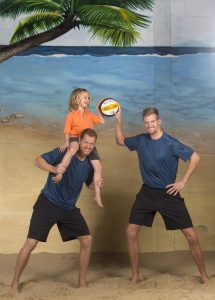
Robert Meeuwsen and Alexander Brouwer, world beach volleyball champions, are ambassadors for the Youth Fund for Sports & Culture.
With the whole family
Brouwer: "I had to get my swimming diploma first, then I could choose a sport to play. Like many boys, I chose soccer, which I played from age six to fourteen, even though my father and two older sisters played volleyball."
Meeuwsen: You don't just start playing volleyball as a kid; you don't play that on the street. So yes, I started playing soccer first. I started playing volleyball when I was nine, and then switched to beach volleyball when I was sixteen.
Brouwer: "When you're five or six years old, volleyball is just too hard, I think. And I think the rest of the family thought so too; no one ever pushed me to play volleyball. But after my soccer games, I spent the rest of the weekend at the sports hall. Or with my dad, or with my sisters."
Meeuwsen: My mother played volleyball, and I often went with her. I really enjoyed that as a child. My father wasn't as involved. Although he was 2.04 meters tall, he didn't play volleyball himself. He wasn't very athletic anyway.
Brouwer: When I was about sixteen, I trained every Sunday with the national team in Zeist. I had to report there at nine in the morning, and we lived in Groningen… My father and I would get in the car early in the morning, when it was still dark outside and no one else was on the road. I have fond memories of those two hours together in the car.
Meeuwsen: My father only started enjoying volleyball later, and then he started following me everywhere. The whole family would go with me to matches. I thought that was perfectly normal back then, but now I see how special it is. I'm grateful to them for it. These days, my parents also go with me to tournaments abroad, which is really cool.
Brouwer: I definitely realized how special it was that my father did all that for me, and I even expressed that. Ha, and on the other hand, I also saw that Dad loved doing it. He's a real sports and volleyball fanatic.
Without the ball
Meeuwsen: I was perfectly fine without a ball. I still am. I wasn't someone who got ready in my sports kit in the morning; I also enjoyed playing computer games. Alexander finds it difficult not to exercise; he has to hit a ball even on vacation. I don't have that problem as much.
Brouwer"When I'm on vacation, I don't sit still for a second. I have to move. Otherwise, I get grumpy. Lying still on a beach lounger for a week isn't for me. I already had that as a child. I played tennis, went out on the ditch in canoes to collect beer caps, played baseball; we came up with all sorts of things. I was a true outdoorsy child."
Kick in the ass
Meeuwsen: Volleyball has given me so much. My entire group of friends, in particular; I know everyone thanks to volleyball. Even my girlfriend! That's also the best thing about playing for a club: you make friends, there's a sense of camaraderie, and it's fun. You win together, learn to lose together. Well, I've learned to deal with losing now, although I still find it difficult. In beach volleyball, you're immediately eliminated from the tournament if you lose, so that's quite difficult. I'm getting used to it, but it's not easy.
Brouwer: Volleyball was largely my upbringing. I started at Lycurgus in Groningen and, in just a few years, progressed through the teams from the Men's 9s to the Men's 1s. As a boy, you spend entire evenings and weekends hanging out with grown men. I absolutely loved it.
I don't feel like I ever really hit puberty. When I started playing volleyball, I found school a bit less interesting, so that did worry my parents a bit. That was the only problem. I never had any problems with coaches. I'm a bit less stubborn and headstrong than Robert, I think.
Meeuwsen: "It was quite necessary for coaches to give me a kick in the ass every now and then. I had a reputation for being quite stubborn, and I regularly had confrontations with coaches who pointed out how things should actually be done. I learned a lot from that."
Through rain and wind
Meeuwsen: "We only got our first sponsor, Red Bull, after we won the World Championship in 2013. So we had to perform first. Before that, we had to invest a lot; we only had small sponsors: glasses, sunscreen, that sort of thing."
Brouwer: That was part of the time. We started very simply. What did we really need? Sunglasses. I emailed every optician in The Hague asking if they would sponsor us, what our goal was, and what we needed. Until one responded enthusiastically: Hofstede Optiek. We still visit them, they still come to matches, they give us advice. They're part of a group that empathizes with us, that follows us at tournaments. They're people who support us. That's a special feeling as an athlete. I'll never forget Nermin Cosovic, a coach from Groningen. A man with such a passion for sports, who did everything for us. He towed us in his little car to qualifying matches all over the country and far beyond, through all kinds of weather.
Far-from-my-bed show
Meeuwsen: We live with some of the squad in a working-class neighborhood in Scheveningen, where there's quite a bit of poverty. It took a long time for us to be accepted. Everyone knows each other, and we stand out quite a bit with our sportswear and national team-themed cars. Since last year, they've suddenly started saying, "Hey neighbor, I saw you on TV." They know who you are. Secretly, they think that's nice.
Brouwer: Robert lives in a neighborhood where some of his neighbors live on welfare, and he's a top athlete. That's pretty strange. My situation is completely different; I live just down the street, with a different demographic. My sister is a gym teacher in Assen. From her, I hear stories about children. Stories that make us, as a true sports family, think: how is that possible in the Netherlands? I never used to think that parents wouldn't be able to pay the membership fees for a sports club. That was a distant concept for me.
Meeuwsen: To be honest, I just can't imagine not being able to play sports as a child. It's simply not possible in my experience; it doesn't exist.
Volleyball through the Youth Fund
Follow Robert and Alexander
Website: www.brouwer-meeuwsen.com
Facebook
Instagram: @brouwermeeuwsen
Twitter:@BrouwerMeeuwsen
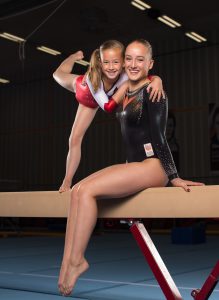
Sanne Wevers, Olympic champion on the balance beam, is an ambassador for the Youth Fund for Sports & Culture. The gymnastics hall was one big playground for my twin sister Lieke and me. We could practically play monkey business there all day long. Our parents were both full-time gymnastics coaches, so we were quite young when we first started there; I think we were about three. If they couldn't find a babysitter, we could join them. Because they were busy training, we didn't get any attention for a while. And that was exactly what made it so much fun! We could do whatever we wanted. When I was five or six, I started getting a bit more serious. But that didn't feel like a big step, simply because our parents were already so into gymnastics.
Papa or Vincent?
"I started training with my father when I was twelve. Before that, gymnastics was a frequent topic of conversation in our home, of course, but my father wasn't too focused on it; he had other students he was busy with. When he started training Lieke and me, we started calling him 'Vincent,' and I found that quite difficult. I'd never called my father by his first name before! Now, I still call him Vincent when I think of him in gymnastics, and otherwise, it's just Dad. I alternate between the two."
Without my parents, I would never have gotten this far in gymnastics. They're so involved, so responsible for our success. We went through a difficult time in 2015. We were no longer welcome at the gymnastics club my parents had founded, Bosan TON in Almelo. My father had already been fired two years earlier due to a difference of opinion. He eventually moved with us to Heerenveen because we could train there. My mother, however, stayed behind at home in Oldenzaal. The first six months were really difficult, especially for my parents, of course. And yes, we shared a dream with the 2016 Olympic Games, but it still felt like it was mainly our fault that we had to make the decision to move.
The will to win
From a young age, Lieke was obsessed with becoming good at gymnastics, while I mostly just enjoyed it all. I just wanted to be in the gym, having fun. Actually, I enjoyed everything as a child; I even played tennis, and when we went ice skating in the winter, I thought it was fantastic.
When I transferred to my father's training group, I consciously decided to truly pursue gymnastics. It felt like the next step. In one fell swoop, my attitude changed from 'all live the fun' to completely serious. Gymnastics requires long hours. You have to train incredibly hard. Physical talent alone isn't enough. For example, as a nine-year-old girl, I was selected because I wasn't considered good enough... But through hard work, the will to win, the will to constantly improve, daring to take that small step every day, I managed to get far.
You don't have to do it alone
Sanne Wevers: "Since the Rio Games, I've received many requests to get involved with charities, but to be honest, I wanted an organization that contributes to something positive. That's what the Youth Sports & Culture Fund does, in my opinion. Sport opens doors for a child's future. I simply wouldn't know what it's like to live without sport. It teaches you mental resilience, it teaches you to set and achieve goals, it teaches you the courage to stick with something, to go for it, it teaches you to trust someone who can help you. Your coach, your team."
There are so many good life lessons for children in sports. Especially the realization that you can't do it alone, but you also don't have to. If you want something, you have to put a lot aside. It's no different with school or a job; you always have to make sacrifices to get ahead. You learn those first steps as a child in sports. That it's indeed not wise to go to bed too late, or to play outside the night before a match.
No worries, just a chance
My parents weren't well off. We didn't really notice that as children; I only learned it later in life. And I really appreciate that. For example, my father worked for a long time without pay at the club where we did gymnastics, so we didn't have to pay dues. It was 200 euros a month because we trained thirty hours a week. That was difficult for us to afford. Meanwhile, they did think it was important that we went on vacation. They saved up and we went to the south of France with a caravan.
I think it's very important that children don't have those financial worries. And that's why I think using the Youth Fund for Sports and Culture is such a sensitive topic; no one wants to be pigeonholed. No one wants a child to see their parents in that situation. I can certainly imagine parents feeling a barrier to asking for help. But you should be able to explain it in such a way that using the fund isn't seen as a worry, but as an opportunity.
Read more
Follow Sanne
Facebook: sanneweversnl
Twitter: @swevers
Instagram: @sannewevers.official
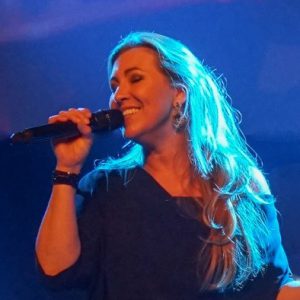
Katelijne van Otterloo, jazz singer and ambassador of the Youth Culture Fund Aalsmeer says:
I believe music, dance, and theater, as well as visiting museums, are crucial for personal development, especially for children. They're an essential counterpart to the general development you receive at school. Creativity and talent must first be discovered and then developed. For this, children must be able to connect with culture in the broadest sense of the word. There are, of course, numerous institutions that subsidize culture, but that's mainly at the national and regional levels. Unfortunately, attention is often lacking at the local level. The Youth Culture Fund does provide this, giving children that opportunity if they can't get it at home for financial reasons. That's why I'm very supportive of the Youth Culture Fund Aalsmeer. I graduated from Delft University of Technology, a fairly rational, technical program, but as a counterpart, I took piano lessons for 13 years from the age of 7, created my own show between the sliding doors with theater, singing, and dance, and took singing lessons for several years. Now I'm on stage as an engineer, and I feel... I am extremely happy... How wonderful it is to be able to give this opportunity to the child 'around the corner' as well..."
Shanice van de Sanden, aanvaller bij het Nederlands vrouwenelftal en Europees Kampioen, gaat zich als ambassadeur inzetten voor het Jeugdfonds Sport & Cultuur. Het Jeugdfonds Sport & Cultuur betaalt de contributie / het lesgeld voor kinderen en jongeren uit gezinnen waar te weinig geld is voor sport, dans, muziek of iets anders creatiefs.
Met voetbal begint Shanice pas laat, een buurman ziet haar op straat voetballen en geeft haar op bij VVIJ, een voetbalclub in IJsselstein. Binnen een paar jaar wordt ze geselecteerd voor Oranje onder zeventien jaar, en speelt ze bij clubs als FC Utrecht, SC Heerenveen en FC Twente. December 2008 maakt ze haar debuut in het Nederlands elftal. In 2016 verhuist ze van FC Twente naar het Engelse Liverpool. Na het Europese kampioenschap met de Oranje Leeuwinnen in 2017, tekent ze een contract bij Olympique Lyon, waar ze afgelopen seizoen de Champions League mee won.
Ambassadeur Shanice ervaart zelf de waarde van sporten en gunt elk kind de kans om gewoon lekker tegen een bal aan te trappen.
'Als ik op het trainingsveld sta, ben ik gelukkig. Nog steeds, elke dag. Ik heb van mijn hobby mijn werk kunnen maken. Die ronde bal heeft me overal gebracht, over de hele wereld. Van Zuid-Afrika tot Miami. Daar leer je zoveel van als mens. Ik kom van ver. Kinderen moeten zichzelf als mens kunnen ontwikkelen. Dat is heel belangrijk. En daarom moeten ze de mogelijkheid hebben om te kunnen sporten, ook al hebben hun ouders geen geld. Sport kan zoveel moois brengen, kijk maar naar mij. Ik heb zoveel mooie dingen meegemaakt, zoveel lieve mensen ontmoet die me hebben geholpen. Want je kan het echt niet allemaal alleen, je hebt hulp nodig. Al die goede mensen hebben me sterker gemaakt, en dat is allemaal dankzij mijn sport. Dat gun ik elk kind.’
Ik heb zoveel mooie dingen meegemaakt, zoveel lieve mensen ontmoet die me hebben geholpen. Want je kan het echt niet allemaal alleen, je hebt hulp nodig. Al die goede mensen hebben me sterker gemaakt, en dat is allemaal dankzij mijn sport. Dat gun ik elk kind.’
Monique Maks, directeur Jeugdfonds Sport & Cultuur is trots dat Shanice zich gaat inzetten voor kinderen die opgroeien in armere gezinnen: ‘De persoonlijkheid van Shanice is duidelijk zichtbaar in haar spel; vol energie, kracht en uitbundigheid maar wat me vooral aanspreekt is dat ze speelt in het belang van het team. Ze heeft geleerd om niet op te geven, positief te zijn en dat heeft haar ver gebracht. Voetbal is voor ons fonds de sport die het meest wordt beoefend en we hopen samen met Shanice nog meer meisjes en jongens te enthousiasmeren. Dat is hard nodig want 378.000 kinderen in Nederland, dat is 1 op de 9, groeit op in armoede.’
Lees het interview met Shanice van de Sanden
Footballer Shanice van de Sanden, an Orange Lioness and player for Toluca FC in Mexico, is an ambassador for the Youth Fund for Sport & Culture. She explains why.
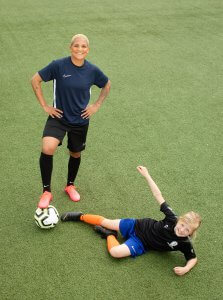
Always want to win
We played games with a tennis ball in the schoolyard every day during recess. I was in seventh or eighth grade. I don't think I was particularly good, because I hadn't played soccer for a club yet. Still, the boys asked me to join, and I simply said yes. I was incredibly fanatical, always wanting to win, every game. Sometimes we played matches against other schools, and then I was even more fanatical, of course.
More than just football
Our neighbor signed me up for VVIJ, a football club in IJsselstein. I'd never done that myself; I mostly stayed indoors, behind the computer and on the phone. Strangely enough, I loved it from the very first training session. I don't know why. The club was more than just football; we all hung out after training, and it was really fun. I met new people and quickly made new friends.
Things took off quickly with football too. Within a few years, I was playing for clubs like FC Utrecht, SC Heerenveen, and FC Twente. But I wasn't immediately very good. Yes, I scored a lot at IJsselstein, but my main strength was my speed, my ability to outrun everyone and deliver good crosses. I had to work incredibly hard to truly become a better footballer. And I still do, every day, every training session. That hard work is ingrained in me. I inherited it from our mother. We have six children at home, and she always had to work incredibly hard for us. And she still does, by the way."
Through rain and snow
My brother and sister and I delivered newspapers to 3,000 homes in IJsselstein for years. We all had to work to make ends meet. My mother, but so did we as children. That's how I learned the value of money from a young age. We never lacked anything at home: I had the football boots I liked, the clothes—that was never a problem. But I also knew how many hours I'd spent delivering newspapers through the rain and snow for those beautiful football boots.
We learned to never give up, to enjoy the little things, to be positive. At VVIJ, I had trainers who were also very positive, who gave me a lot of confidence as a child. That was great, because if someone else believes in you, who are you to say you don't believe in yourself?
Going to the club alone
I was the only one in the family who played football seriously. We watched it on TV, my brother had a season ticket for FC Utrecht, and three brothers played for a club for a few years, but football wasn't really a family affair. So no one came to watch my games. Not even my mother. It just wasn't possible; everyone was far too busy with their own lives, with work. So I went to the club alone, by bike, or I'd ride along with someone.
Although I did see all the other parents on the sidelines, I never missed my mom in those situations; I was perfectly happy with how things were. We were so close as a team that we did everything together. I even became friends with the other parents. Rides were always available; that wasn't a problem.
To be honest, I never talked to my mother about it, but I don't think she found it difficult that she couldn't come visit. She did see that I always came home happy. And that's the most important thing as a parent, I think, to see that your child is happy.
Happiness on the training field
Just kicking a ball can make you so happy. You don't even have to say anything. In sports, everyone understands you. Someone starts laughing, others are simply infected by that laughter. You learn how to lose, and how to cope with it. You learn how to lose together, how to win together, how to achieve a goal. That's all so valuable.
As a child, I never dreamed I'd achieve this. I didn't even know there was such a thing as the Women's Champions League, and I had no role models of female footballers I thought: that's what I want to be. I just wanted to be good "when I grow up." And now I'm someone girls dream about, someone they think: that's what I want to be! I don't fully grasp that.
When I'm on the training field, I'm happy. Still, every day. I've been able to turn my hobby into my job. That round ball has taken me everywhere, all over the world. From South Africa to Miami. You learn so much from it as a person. I've come a long way.
Children should be able to develop themselves as people. That's very important. And that's why they should have the opportunity to play sports, even if their parents don't have money."
Sports can bring so much beauty, just look at me. I've experienced so many wonderful things, met so many kind people who have helped me. Because you really can't do it all alone; you need help. All those good people have made me stronger, and that's all thanks to my sport. I want that for every child.
Follow Shanice
Facebook
Instagram: @svandesanden
Twitter: @ShaniceJanice
LWD Basket is trotse ambassadeur van het Jeugdfonds Sport & Cultuur Fryslân.
Facts & numbers
children and young people became members of a club through us in 2024.
in 2024, children and young people became members of a sports club through us.
in 2024, children and young people became members of a cultural club through us.
issued sports and cultural equipment in 2024.

